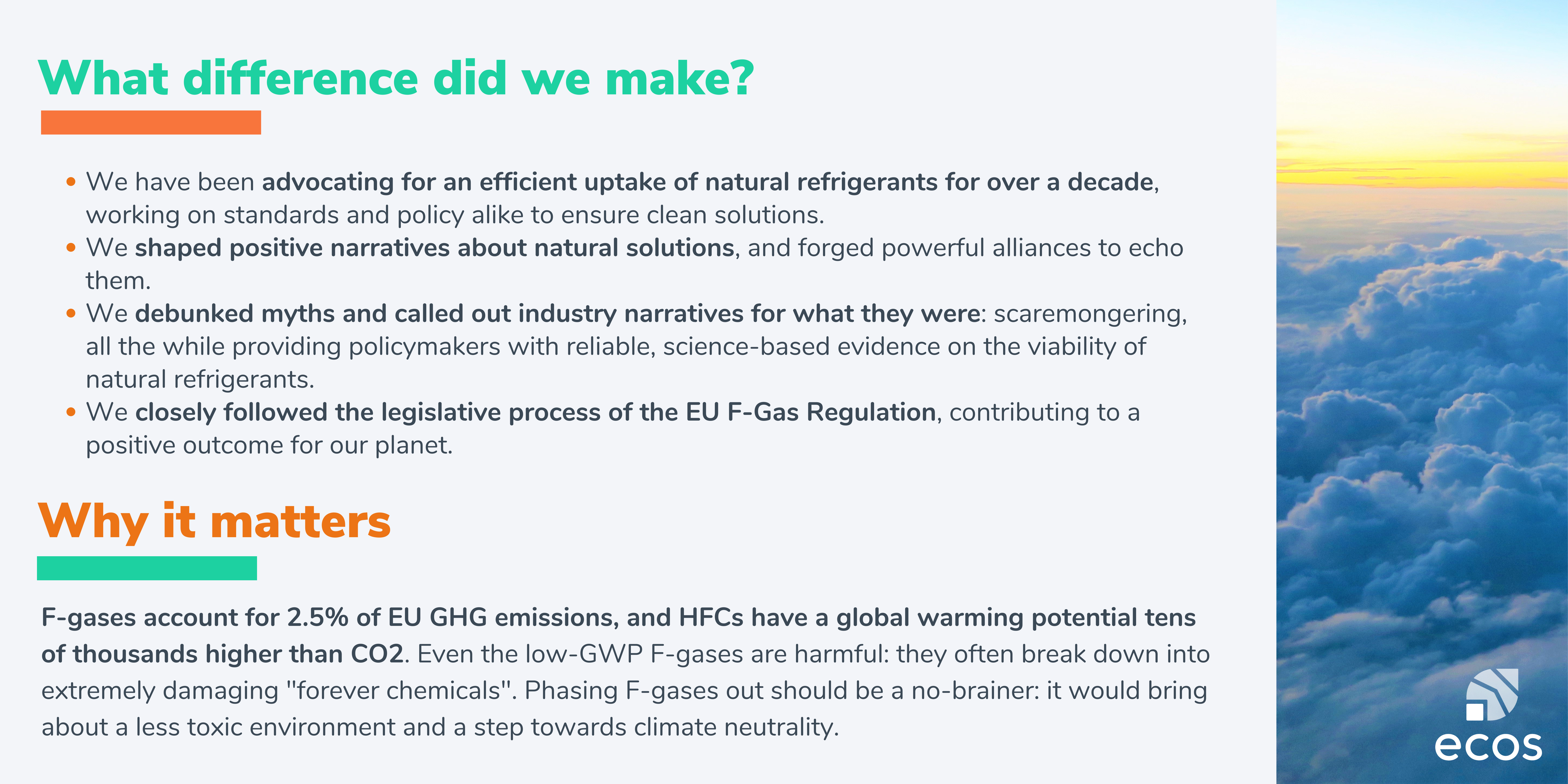The beginning of the end for climate-damaging fluorinated gases
F-gases, not commonly known but commonly used in household appliances like fridges, air conditioners, and heat pumps, will finally be phased out in the EU – with some types of F-gases banned completely. A success for ECOS, as we strongly pushed for this to happen, but above all – a great success for our planet.
In October 2023, the EU reached a landmark agreement to phase out all F-gases by 2050. Its new F-Gas Regulation is an ambitious step, and a progressive piece of legislation, which will make Europe a leader in the implementation of the Montreal Protocol and the adoption of natural refrigerant-based technologies.
At ECOS, we are proud to have played an integral part in shaping the narrative around polluting F-gases, actively pushing for the uptake of natural refrigerants across the board.

When the solution becomes the problem
Fluorinated gases (F-gases) are a group of synthetic, human-made gases that include hydrofluorocarbons (HFCs), perfluorocarbons (PFCs), sulphur hexafluoride (SF6), nitrogen trifluoride (NF3), and hydrochlorofluorocarbons (HCFCs). They are commonly used in various industrial applications, such as refrigeration, air conditioning, insulation, electronics manufacturing, and switchgear. In other words, they can be found in our homes, cars or supermarkets – the list goes on.
F-gases were initially developed to solve another environmental problem: they came into the picture as substitutes to ozone-depleting substances, and fixed the ozone layer problem for a while. It quickly became evident, however, that they brought about new problems due to their high global warming potential and a huge impact on the environment. Have you ever heard of the ultra-polluting “forever chemicals”? F-gases are the primary source of those dangerous substances in the EU. Add to this the fact that they account for 2.5% of the EU’s greenhouse gas emissions, and you have a recipe for… an environmental disaster.
Natural alternatives to the rescue
Luckily, this particular disaster is entirely preventable. There are many F-gas alternatives on the market. Natural refrigerants such as ammonia, hydrocarbons, and carbon dioxide can be used in heat pumps and air conditioning while maintaining efficiency and cost-effectiveness. In the case of switchgear, F-gas-free technology is already used, and it does not even require major changes to existing infrastructure.
A solution long in the making
ECOS spotted the potential of natural refrigerants early on and has been actively advocating for their efficient uptake for over a decade. It is rather simple: they are safe, they are available and they are… natural.
However, industry is adamant to continue using polluting F-gases, and reverts to scaremongering, claiming that an F-gas phase-out will come at the expense of decarbonisation. We have tirelessly worked to counter these claims, following the legislative process from A to Z, and actively engaging with policymakers, providing them with bulletproof, science-based arguments in favour of natural refrigerants.
We gave praise where it was due (well done to the European Parliament for their ambition!) and convinced the unconvinced, reaching out to Member States, always with the Goliath of F-gas industry lobby looming around the corner.
But we did not do all this by ourselves – we rallied our members and other like-minded NGOs, coalitions, and progressive industry, developed joint positions, briefed the media, and made sure our calls and narrative were echoed widely. As a result, many of our asks were reflected in the agreed text of the EU F-Gas Regulation, which will finally send the right message to the market: it is time to innovate because F-gases are becoming a thing of the past.
Towards an F-gas free future
The F-Gas Regulation will enter into force in 2024. From 2050 onwards, the amount of hydrofluorocarbons (HFCs) allowed on the EU market each year will be zero.
This sets an important example for global players. The Montreal Protocol and the Kigali Amendment have set the tone for HFC phase-down, but the EU Regulation takes this commitment many steps further by aiming to phase F-gases out entirely. One can only hope that other regions will build on this inspiring example, and embrace natural refrigerant based technologies.
The solution is within reach. Let’s not miss out on the opportunity.


